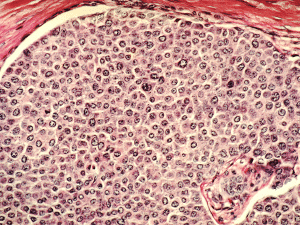New Targeted Therapy for Hormone Receptor-positive Breast Cancer
The FDA has approved capivasertib for the treatment of breast cancers with certain mutations.
The U.S. Food and Drug Administration (FDA) has approved capivasertib (Truqap), in combination with fulvestrant (Faslodex), for the treatment of adult patients with locally advanced or metastatic hormone receptor (HR)-positive, HER2-negative breast cancer that harbors one or more mutations in the genes PIK3CA, AKT1, or PTEN. Patients with metastatic disease are eligible following progression on at least one endocrine therapy, and patients with locally advanced disease are eligible following a recurrence within 12 months of adjuvant therapy.

Dr. Cecil Fox (Photographer).
Capivasertib is a small molecule inhibitor of the protein AKT, which promotes tumor growth. AKT functions as part of a larger pathway that also involves the proteins encoded by PIK3CA and PTEN; blocking AKT can therefore dampen uncontrolled signaling caused by mutations in any of these three proteins. Such mutations are common in HR-positive, HER2-negative breast cancers and may spur resistance to endocrine therapies.
A concurrent approval was granted to the FoundationOne CDx assay, a companion diagnostic to identify tumors harboring a PIK3CA/AKT1/PTEN mutation.
The approval of capivasertib was based on results from the randomized, double-blind, placebo-controlled, multicenter, phase III CAPItello-291 trial, which were presented at the 2022 San Antonio Breast Cancer Symposium. Researchers recruited 708 patients with locally advanced or metastatic HR-positive, HER2-negative breast cancer that had progressed during prior aromatase inhibitor therapy and had been treated with up to two prior lines of endocrine therapy and up to one prior line of chemotherapy. Tumors from 289 patients harbored mutations in PIK3CA, AKT1, or PTEN. All patients received fulvestrant and were randomly assigned (1:1) to receive either capivasertib or a placebo until disease progression or unacceptable toxicity.
In the subgroup of patients with PIK3CA/AKT1/PTEN mutations, the progression-free survival was 7.3 months in the capivasertib arm and 3.1 months in the placebo arm. While the difference in progression-free survival between trial arms was statistically significant in the overall population, an exploratory analysis showed that patients without PIK3CA/AKT/PTEN mutations had no significant difference in progression-free survival between the capivasertib and placebo arms. This suggested that the benefit was primarily constrained to patients whose tumors harbored PIK3CA/AKT/PTEN mutations.
HR-positive, HER2-negative breast cancer is the most common subtype of breast cancer, affecting around 70% of patients. Over 50% of all breast cancers harbor a mutation in PIK3CA, AKT1, or PTEN. According to federal statistics, it was estimated that 297,790 individuals would be diagnosed with breast cancer and 43,170 patients would die of the disease in the United States in 2023.
The FDA rendered its decision on November 16, 2023.
